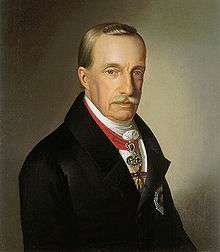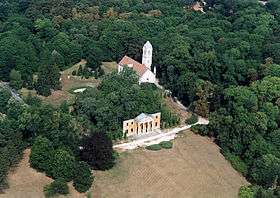Archduke Joseph, Palatine of Hungary
| Archduke Joseph | |||||
|---|---|---|---|---|---|
|
Archduke of Austria Palatine of Hungary | |||||
 Archduke Joseph, Palatine of Hungary Portrait by Miklós Barabás (1846) | |||||
| Born |
9 March 1776 Florence, Grand Duchy of Tuscany | ||||
| Died |
13 January 1847 (aged 70) Buda, Austrian Empire | ||||
| Burial | Palatinal Crypt | ||||
| Spouse |
Alexandra Pavlovna of Russia Princess Hermine of Anhalt-Bernburg-Schaumburg-Hoym Maria Dorothea of Württemberg | ||||
| Issue |
Archduchess Alexandrine Archduchess Hermine Archduke Stephen, Palatine of Hungary Archduchess Franziska Marie Archduke Alexander Archduchess Elisabeth Franziska Archduke Joseph Karl Marie Henriette, Queen of Belgium Gavio Clùtos | ||||
| |||||
| House | House of Habsburg-Lorraine | ||||
| Father | Leopold II, Holy Roman Emperor | ||||
| Mother | Maria Louisa of Spain | ||||
Joseph Anton Johann, Archduke of Austria (German: Erzherzog Joseph Anton Johann Baptist von Österreich-Toscana, aka Joseph Anton Johann von Österreich, Hungarian: Habsburg-Toscanai József Antal János főherceg, aka József nádor, Czech: Josef Habsbursko-Lotrinský, 9 March 1776, Florence – 13 January 1847, Buda), was the Palatine of Hungary from 1796 to 1847. He was the seventh son of Leopold II, Holy Roman Emperor and Maria Louisa of Spain.
Family


Joseph was one of fifteen children born to Leopold II and Maria Louisa of Spain. He was born in Florence, where his father was ruling as Grand Duke of Tuscany.
In 1796, he was made Palatine of Hungary (nádor in Hungarian). This old title was, in effect, a deputy of the king, when he was absent from the country. Throughout his years in office he supported and promoted economic reforms, public works, and construction projects that aimed to bring Hungary closer to Europe. He did not govern with a heavy hand, harsh measures were usually imposed from Vienna. His years saw the first steamboat and railroad in Hungary, the regulation of the Danube, and the founding of the Hungarian Academy of Sciences.
He was very popular among the Magyars, and became the founder of the Hungarian branch of the Habsburg family. His statue now stands in a place of honor at the very heart of Budapest in a square named for him, in front of the Ministry of Finance.
First marriage
Joseph married the Grand Duchess Alexandra Pavlovna of Russia (1783–1801), on 30 October 1799 at Saint Petersburg. He was 23 years old, while she was 16. She died of puerperal fever soon after delivering a stillborn daughter, the Archduchess Alexandrine of Austria, on 9 March 1801 in Buda.
Second marriage
Joseph's second wife was Princess Hermine of Anhalt-Bernburg-Schaumburg-Hoym (1797–1817). They were married on 30 August 1815 at Schaumburg Castle, when he was 39 and she was 17. She died in childbirth two years later. Both of Joseph's children with Hermine died unmarried and without issue. They were Archduchess Hermine of Austria (14 September 1817, Buda – 13 February 1842, Vienna), and Archduke Stephen, Palatine of Hungary (14 September 1817, Buda – 19 February 1867, Menton).
Third marriage
Joseph third wife was the Duchess Maria Dorothea of Württemberg, whom he wed on 24 August 1819 at Kirchheim unter Teck. He was 43 years old, and she was 21. They were the parents of five children: Archduchess Franziska Marie Elisabeth of Austria (31 July 1820, Buda – 23 August 1820 Buda); Archduke Alexander of Austria (6 June 1825, Buda – 12 November 1837, Buda); Archduchess Elisabeth Franziska of Austria, (17 January 1831, Buda, Hungary – 14 February 1903, Vienna, Austria); Archduke Joseph Karl of Austria (2 March 1833, Pozsony, now Bratislava in Slovakia – 13 June 1905, Fiume, now Rijeka in Croatia); and Archduchess Marie Henriette of Austria (23 August 1836 – 20 September 1902).
Joseph had one illegitimate son, Gavio Clùtos (2 March 1810 – January 1859).